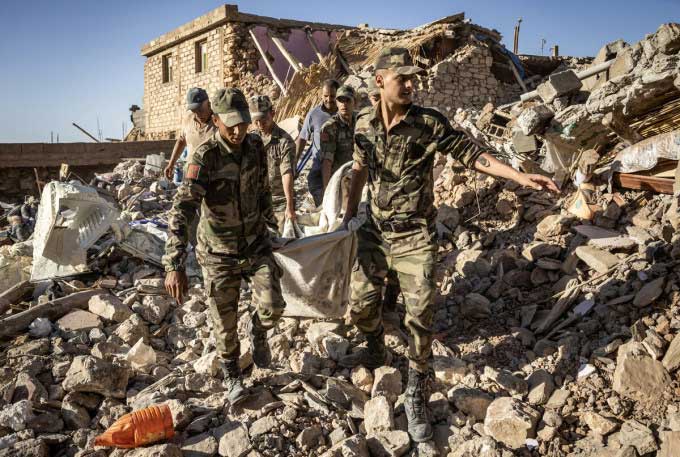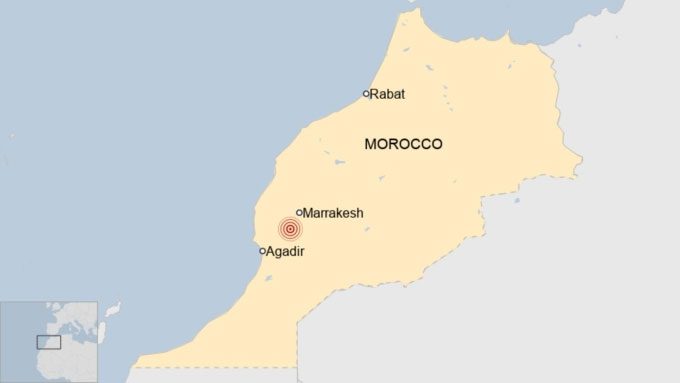The death toll from the earthquake in Morocco has risen to over 2,000 as rescue teams race to find survivors.
On the night of September 9, the Moroccan Ministry of Interior reported that the earthquake had killed at least 2,012 people, mostly in the epicenter province of Al-Haouz and Taroudant province. More than 2,000 people were injured, with 1,404 in critical condition.
The United States Geological Survey (USGS) stated that the 6.8 magnitude earthquake on the night of September 8 struck at a depth of 18.5 km in the mountainous region, approximately 72 km southwest of the tourist city of Marrakesh. Strong tremors were felt in coastal cities including Rabat, Casablanca, and Essaouira, causing widespread damage and panic among residents and tourists seeking shelter at midnight.
Colonel Hicham Choukri of the civil defense forces, who is overseeing the relief efforts, remarked that the epicenter and intensity of the earthquake created a “special emergency situation.” The USGS categorizes earthquakes with epicenters below 70 km as “shallow,” which typically cause more severe damage compared to “deep earthquakes,” due to the intense shockwaves spreading hundreds of kilometers.
Following a meeting chaired by King Mohammed VI, the palace announced three days of national mourning, with flags at half-mast on all public buildings.
Soldiers and civilians search for survivors amid the rubble in Taroudant province on September 9. (Video: AFP).
In the mountain village of Tafeghaghte near the epicenter, hardly any buildings remained standing. The traditional clay bricks used by locals to construct homes could not withstand this rare earthquake.
Almost all houses in the Asni area, about 40 km south of Marrakesh, were damaged. The village of Tansghart, located on the slope of the valley along the road from Marrakesh to the High Atlas mountains, was reported as severely affected by Reuters. Homes clinging to steep hillsides were cracked, and those that still stood were missing sections of walls or plaster. Two minaret towers of a mosque have collapsed.
This is the strongest earthquake ever to hit the North African kingdom. The World Health Organization (WHO) reported that over 300,000 people were affected in Marrakesh and surrounding areas. An expert described this as the “largest earthquake in over 120 years” in the region.
“In places where earthquakes rarely occur, buildings are not constructed to be resilient. Many buildings collapsed, leading to high casualties,” said Bill McGuire, an emeritus professor at University College London.

Moroccan Royal Armed Forces carry a body from a destroyed house in the earthquake in the mountain village of Tafeghaghte, southwest of Marrakesh on September 9. (Photo: AFP).
Hundreds gathered in Jemaa el-Fna Square in Marrakesh to spend the night due to fears of aftershocks, with some using blankets while others slept on the ground. Houda Outassaf, a local resident, said she was “still in shock” after feeling the ground shake beneath her.
“At least 10 people in my family have died. I can hardly believe it, as I was with them just two days ago,” she said.
The regional blood center in Marrakesh is calling on citizens to donate blood for the injured. The Red Cross indicated that it is mobilizing resources to support the Moroccan Red Crescent, but the regional director for the Middle East and North Africa, Hossam Elsharkawi, warned that “the response efforts could take months, even years.”
On the evening of September 9, the Vietnamese Embassy in Morocco stated that it had not yet recorded any information regarding injuries to Vietnamese nationals in the tragedy.
In 2004, at least 628 people were killed and 926 injured when an earthquake struck the Al Hoceima province in northeastern Morocco. In 1960, a 6.7 magnitude earthquake in Agadir resulted in over 12,000 deaths.

Location of the epicenter of the earthquake in Morocco. (Graphic: BBC).
| Vietnamese citizens in need of assistance can contact the Vietnamese Embassy in Morocco at +212 7 61 86 87 29 and +212 6 18 53 65 52 or the Citizen Protection Hotline of the Consular Department, Ministry of Foreign Affairs at +84 981 84 84 84. |



















































